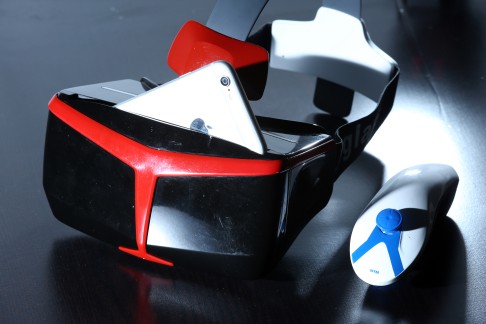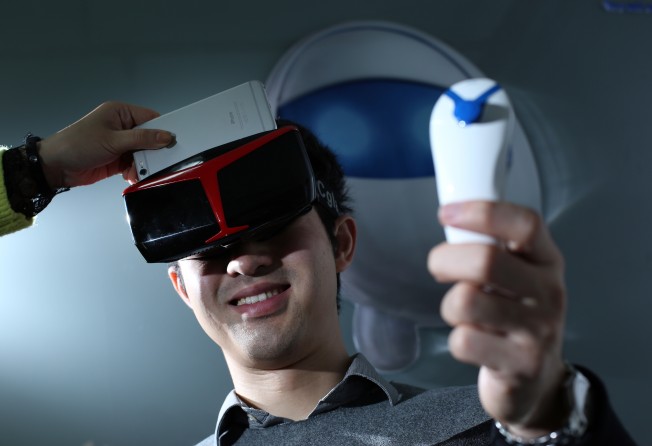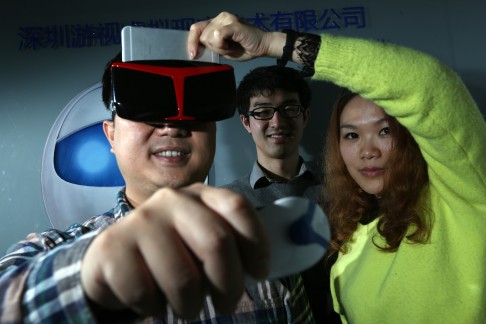
Chinese virtual reality headset includes motion sensors for gaming and sex apps

The prospect of interactive virtual sex may become a reality soon as a Chinese start-up prepares to introduce what they say is the world’s first wireless system that adds motion sensors to virtual reality.
With the technology, users will be able to choose everything from the colour of a partner’s hair to a specific position. The virtual partner will interact, adapting to the user’s movements, its creators said.
A number of companies around the world are trying to merge the worlds of technology and adult entertainment. But existing technologies emphasise on the visual side of virtual reality, while the Shenzhen-based team behind the device - UC Glass - said it has integrated motion detection.
“With our VR head-mounted display, you look up and there is your partner, and you look down and you will see yourself, just as you would in reality,” said Wu Zhongyuan, chief operating officer in an interview at their office in Nanshan district.
“Our strongest edge over other players in the world is our somatosensory, or motion-sensing, algorithm that can be turned to many different uses and interact with the VR headset,” he said.
The product’s design and algorithm were being still being finalised, but Wu said internal tests have shown “a very responsive and interactive experience”.
Drawings of a prototype show the system comprises three parts: a user’s smartphone, a VR headset and a handheld controller.
Similar to the Samsung Gear VR and the Google Cardboard, UC Glass has a headset that straps on to the head and holds the smartphone in front of the eyes. The phone acts as the hardware and display for the VR system. The lenses in the headset create an immersive effect while the game or video is played on the smartphone’s screen.
The headset will be compatible with smartphones of sizes between 4.7-inch and 5.5-inch. The smartphone’s motion sensors allow a 360 degree view, while the display’s field of view is around 110 degrees.
The controller has a self-developed chip with a nine-axis sensor that measures acceleration, gyroscopic positions and magnetic forces so that users’ movements can be integrated into VR environments, offering complex, human-like sensations, said chief technology officer Hu Jinhui, who has a PhD in motion-sensing technologies.
“The sensors in the controller track the user’s hand movement and, judging from its acceleration and other movement features, suggest what the user wants the do,” Hu said.
“What sets us apart from devices like Oculus Rift is that UC Glass doesn’t have to be hooked up to a computer,” Hu said. “It can be taken with you anywhere.” The computing is done by its chip in the controller, which connects with the smartphone by Bluetooth, he said.
The chip could be also be used in sports equipment or weapons, he said. Other possible applications include taking a class, virtual travelling and fitness games. Hu said the technology will be open-source, so that developers could build custom content. The company was in talks with sex toy makers and game developers to make controllers that use their chip.
The team came out of a business incubator called Zhongke Creator Star, which is sponsored by the Xian Institute of Optics and Precision Mechanics of the Chinese Academy of Sciences. The institute is one of the project’s angel investors.
The team also took fifth place in the Third Chinese Innovation and Entrepreneurship Competition out of the 157 projects from all across the mainland. The team, founded in June last year, has grown to about 15 now.
“Nowadays everybody is looking down at their phones, and that’s not a great thing for our health. I think that’s going to change with the advance of VR, which will let us, for instance, write our emails with virtual keyboards while looking into a headset, Minority Report-style,” Wu said.
But Wu said the team was in need of funds to optimise the algorithms, so they were getting ready to generate the money it needs on crowd-funding website Indiegogo at a price of around US$200 each, with the target of selling 1,000 units and thereby raising US$200,000.
Critics say VR pornography is overhyped as there is no equipment on the market to shoot for VR with good enough quality, among other reasons. But more companies are looking to get into the market, including Canada-based Utherverse, which plans to add gesture-control and haptics technology into Oculus Rift.
